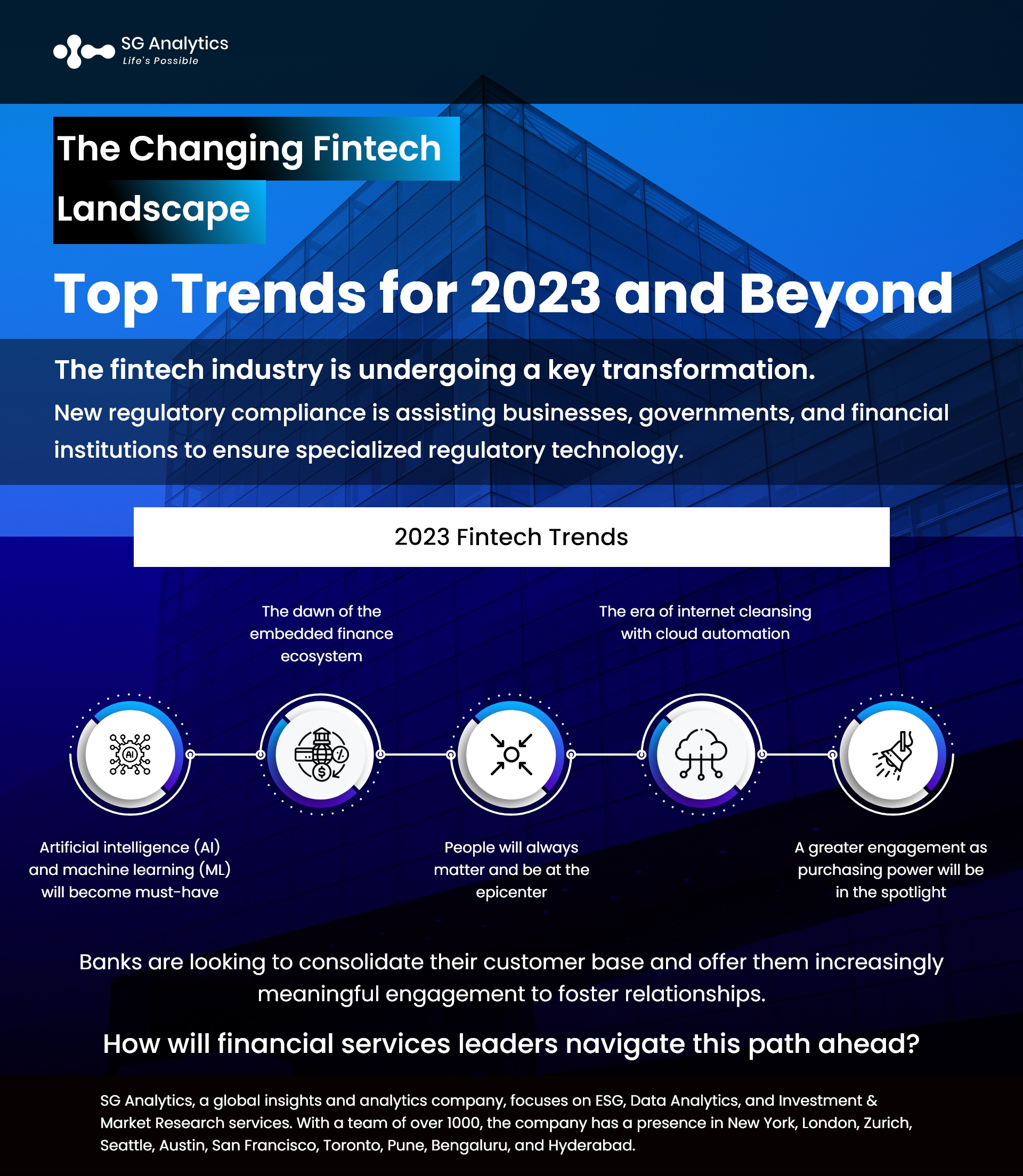In 2022, fintech can arguably be considered one of the most challenging sectors in the post-pandemic world. The economic downturn hit the fintech sector hard, thereby changing the motivation of investors, consumers, and startups. Irrespective of the crisis, it opened new opportunities for financial institutions. Despite the downbeat pessimism, the fintech sector is not at the end.
The fintech sector is innovating new solutions and technologies to fulfill the growing demands of consumers, businesses, and regulatory bodies worldwide. This continuous need to innovate is enabling businesses to keep running profitably even during economic volatility. The sector is evolving with the changing market trends, and numerous socio-economic factors play a major role in shaping both local markets and the global financial industry.
Now is the time to explore the latest fintech industry trends that will dominate the industry and shape businesses, user experience, and global consumer demands. Some of the encouraging trends that are likely to assist fintech institutions in 2023 and beyond are as follows.
Read more: 7 Trends That BFSI Industry Cannot Ignore Anymore

2025 Fintech Trends
-
Artificial Intelligence (AI) and Machine Learning (ML) will Become Must-have.
By 2023, artificial intelligence (AI) and machine-learning algorithms will assist fintech institutions in supporting their everyday transactions in banking, lending, and credit risk assessment. They will likely have a more significant impact on providing access to financial services. Fintech innovation has enabled 1.2 billion unbanked people to gain access to different financial services in the last ten years, as per the reports issued by the World Bank. However, almost 3.5 billion people worldwide are still excluded from the formal financial sector. And many of them are not able to acquire a bank account, thus compelling them to obtain credit through informal or expensive loan sharks. By leveraging AI technology, financial institutions can use this to their advantage and increase their revenues, offering a unique multichannel experience to accelerate innovation cycles. And with the impact of Web3 becoming more apparent, there is also a rising demand for regulation.
AI algorithms will also assist with financial software development and play a bigger role in deciding who gets access to different financial services. Adopting AI and machine learning in the fintech industry will help make easier decisions to issue loans, negotiate, and detect fraud. However, the public also needs to understand the rising demands concerning the ethical impact of AI in decision-making.

-
The Dawn of Embedded Finance Ecosystem
While the existing ecosystem of embedded finance is enormous, it is predicted to grow significantly in 2023. Researchers estimate that the embedded payment industry is set to grow by 40.4% annually. With embedded finance, financial enterprises will be able to offer complete solutions throughout a customer's journey and increase customer satisfaction along with business revenue. It will also help cover other financial services like banking, investment, credit, payment processing, lending, or insurance, thus facilitating a seamless and easy-to-use customer journey.
Among all forms of embedded finance, BNPL or buy now pay later is advancing notably. This payment option equips purchasers to buy now and pay for products later by splitting their purchase sum into multiple installments.
Read more: Forecast: Top Venture Capital Market Trends

-
People will Always Matter and Be at the Epicenter
One of the essentially evergreen and yet paradoxical trends that will grow in importance with the rise of new technologies is the human factor. Irrespective of the extensive artificial intelligence growth, machine learning, or metaverses, people will always be the very factor that will propel financial institutions forward or will put them out of the game. This is why it is more significant than ever for enterprises to find their 'A' team. They will help financial institutions understand business and fit in well with the culture to be change agents. On the contrary, horizontal networking is also emerging as a crucial component against an apparent crisis and the sluggishness of institutions in the post-pandemic era. They need to involve themselves in a large community of entrepreneurs to learn constantly and help each other to build sustainable businesses.
-
The Era of Internet Cleansing with Cloud Automation
The world today is on the cusp of the Internet cleansing era. After nearly two decades of enormous volumes of social and commercial activity being migrated online, there has been a sudden surge in many risky, unethical and illegal phenomena. Industry regulators, consumers, and the media are now putting pressure on internet organizations to ensure the integrity of their platforms, for the safety of users, and to establish reliable transactions and interactions. At the same time, security, trust, and privacy are becoming board-level topics for financial institutions, and budgets for compliance are growing.

Fintech vendors are also leveraging data and cloud automation to establish the new security standard in different verticals. This need for fundamental and radical improvement in the available tools will equip financial institutions to assess risk and fraud. However, many large financial institutions are inherently slow to embrace these changes with curiosity and are still operating with a more limited set of tools.
Read more: Biggest BFSI Trends to Watch out for in 2022
-
A Greater Engagement as Purchasing Power will be in the Spotlight
With increased inflation, consumers are favoring brands and payment providers that help them to save. Today the focus is not on convenience and speed of transactions but rather on the tightening of purchasing power. This is helping in translating the purchasing power into increased usage of different online payments and BNPL (buy now, pay later), equipping consumers to save and plan large purchases. The latest McKinsey 2022 Digital Payments Consumer Survey highlighted that almost nine in ten Americans use some form of digital payment. Financial institutions are engaging with their consumers by rapidly evolving digital solutions in a variety of ways. These alternatives also exhibit greater gains.
For greater engagement, digital wallets are offering tremendous potential to marketing and purchase departments. By integrating a more robust engagement, institutions can correlate with a positive customer experience and create a flywheel effect by involving higher retention and net new acquisitions.

Key Highlights
-
Over the last few years, the fintech industry has been evolving with market trends in order to meet customers' needs along with business goals and regulatory demands
-
The Fintech sector in India is now estimated to grow at a CAGR of 6.3% between 2022 and 2028.
-
The significance of the user experience, along with the capacity to react to regulatory changes, is set to play a vital role in redefining the future of the fintech ecosystem.
Read more: Top Trends That Will Shape Investment Banking In 2022
In Conclusion
The fintech industry is undergoing a key transformation as new regulatory compliance is assisting businesses and governments along with financial institutions to ensure specialized regulatory technology.

The new fintech advancements and trends are opening new opportunities for business leaders and customers worldwide. From safer cryptocurrency trading to better digital payment options and efficient credit scoring for banks and compliance, these new innovations are offering exciting things to fintech in 2023. It also provides users with comprehensive monitoring of their data along with reporting and compliance features.
Out of the top fintech trends in 2023, embedded finance and alternative lending are predicted to emerge as the most remarkable.
With AI technology shaking the market, it is equally assisting businesses to reduce their overhead costs. In addition, SaaS (Software as a Service) platforms are also assisting in improving customer and user experience.
While it is impossible to conclude how things will turn out in 2023 for fintech, it can be certainly stated that 2023 will witness a significant transition in the financial industry that technological disruption, regulations, and more market trends will support.
With a presence in New York, San Francisco, Austin, Seattle, Toronto, London, Zurich, Pune, Bengaluru, and Hyderabad, SG Analytics, a pioneer in Research and Analytics, offers tailor-made services to enterprises worldwide.
A market leader in the BFSI space, SG Analytics assists businesses with insightful, relevant research along with sophisticated technology solutions. Contact us today if you are in search of a BFSI firm that helps in driving value-accretive decisions and executing efficient processes to enhance the efficacy of your investments.









